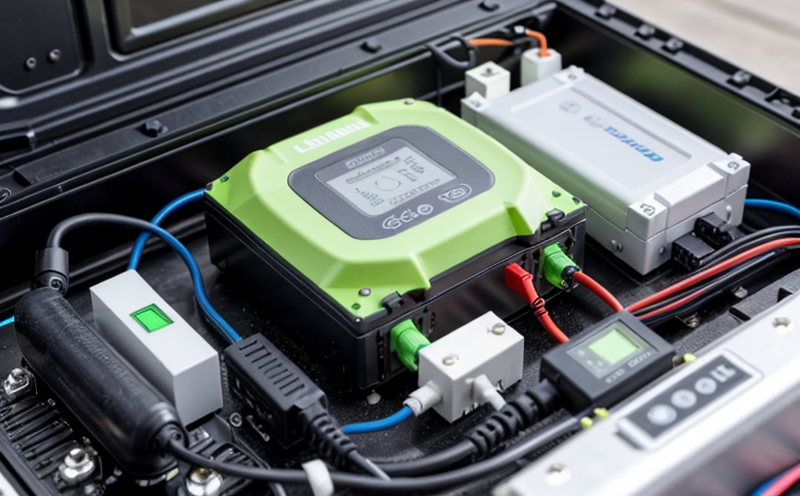Lithium-Ion Battery Testing
Lithium-ion batteries are widely used in portable electronics and electric vehicles due to their high energy density, long cycle life, and relatively low self-discharge rate. The performance of these batteries is critical for the safety, reliability, and efficiency of a wide range of applications.
The testing of lithium-ion batteries involves several key parameters that ensure the quality and consistency of products in various sectors such as automotive, consumer electronics, and renewable energy storage. Testing includes both laboratory evaluation of battery cells and modules, as well as field testing under real-world conditions.
Our testing services encompass a comprehensive set of procedures aimed at ensuring compliance with industry standards like ISO 12405-2 for cell tests and IEC 62660-3 for module tests. These tests are designed to simulate the operational stresses that batteries might encounter during their lifecycle, providing valuable insights into performance metrics such as capacity retention, internal resistance, and cycle durability.
At our laboratory, we employ state-of-the-art equipment and methodologies to conduct these tests with precision and repeatability. Our team of experts ensures that each test is conducted under controlled conditions, adhering strictly to the relevant standards and best practices in the industry.
Why It Matters
The reliability and safety of lithium-ion batteries are paramount in ensuring consumer trust and regulatory compliance. With increasing demand for electric vehicles (EVs) and renewable energy storage solutions, the stakes are higher than ever before. Proper testing ensures that these batteries can meet stringent performance requirements, extending their operational life and reducing the risk of failure.
By identifying potential issues early on through rigorous testing, manufacturers can implement corrective actions that enhance overall product quality. This not only protects end-users but also fosters innovation by encouraging continuous improvement in battery technology. Compliance with relevant standards is essential for market entry and ongoing operations, ensuring seamless interaction within supply chains and regulatory frameworks.
In the context of EVs, reliable batteries are crucial for achieving optimal range and performance. In renewable energy storage systems, their efficiency directly impacts grid stability and sustainability goals. Therefore, thorough testing plays a pivotal role in advancing technology while maintaining high standards of safety and reliability.
Industry Applications
| Application Area | Description |
|---|---|
| Consumer Electronics | Includes smartphones, tablets, and laptops. Ensuring consistent performance and safety is critical for brand reputation. |
| Automotive Industry | Covers electric vehicles where battery reliability impacts driving range and safety. |
| Renewable Energy Storage | Ensures efficient operation of batteries in solar and wind energy systems, contributing to sustainable power generation. |
| Aircraft & Aerospace | Battery performance is crucial for electric aircraft development and mission-critical aerospace applications. |
| Medical Devices | Ensures that portable medical devices operate reliably under demanding conditions, supporting patient care. |
| Smart Grids & Energy Storage Systems | Battery performance in these systems is vital for optimizing energy distribution and reducing carbon footprint. |
The diverse applications of lithium-ion batteries underscore the importance of thorough testing to meet specific requirements across various industries. Our laboratory offers specialized testing solutions tailored to each sector, ensuring that products comply with stringent standards and deliver consistent performance.
Why Choose This Test
Lithium-ion battery testing is essential for several reasons. Firstly, it ensures compliance with international standards such as ISO 12405-2 and IEC 62660-3, which define the parameters that must be met for safe and effective operation. Secondly, rigorous testing helps identify potential weaknesses in design or manufacturing processes early on, allowing manufacturers to make necessary adjustments before large-scale production.
Moreover, these tests provide valuable data regarding battery performance metrics like cycle life, energy density, and internal resistance. This information is crucial not only for improving product quality but also for optimizing the overall supply chain. By conducting thorough testing at every stage of development, companies can reduce warranty claims and improve customer satisfaction.
Our laboratory offers advanced equipment and experienced personnel to conduct these tests accurately and consistently. We offer a range of services including electrochemical impedance spectroscopy (EIS), accelerated aging, and full discharge/charge cycles. These methods provide comprehensive insights into battery behavior under various conditions, ensuring that products meet the highest standards.
Choosing our testing service means gaining access to industry-leading expertise and state-of-the-art facilities. Our commitment to accuracy, reliability, and consistency ensures that you can trust the results of your tests. By partnering with us, you not only ensure compliance but also gain a competitive edge in an increasingly demanding market.





